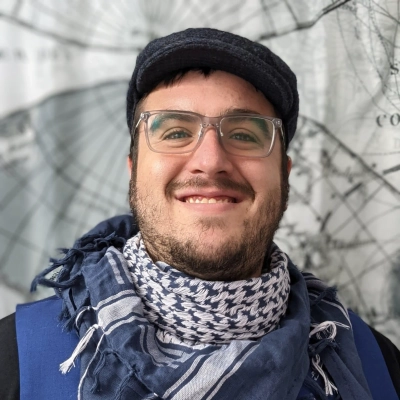8 Creative Solutions for Accommodating Employees with Disabilities
Companies across industries are finding innovative ways to create more accessible workplaces, as revealed by industry experts who have implemented successful accommodations. These eight practical solutions demonstrate how customized workstations, voice-activated systems, and thoughtful communication practices can transform workplace accessibility. From reimagining roles to implementing visual cue systems, these approaches not only support employees with disabilities but enhance efficiency and safety for entire teams.
Multi-Channel Meetings Transform Collaboration for All
One creative solution I've worked on to better accommodate employees with disabilities was rethinking how we used collaboration tools. Instead of defaulting to video calls—which can be draining or inaccessible for people with certain conditions—we introduced a multi-channel meeting format. Every live discussion was paired with a shared, structured document where team members could contribute before, during, and after the call.
For one employee with a hearing impairment, this approach was transformative. Instead of struggling to follow rapid-fire conversations, they had equal access to the conversation in writing and the space to add their perspective without pressure. But what we didn't expect was how much this benefited the wider team. People who were quieter by nature or processing in a second language started contributing more. The quality of discussion improved because thoughts weren't lost in the moment—they were captured and built upon.
This shift had a direct impact on the organization. Meetings became more inclusive and less performative. Decisions were clearer because context lived in the document, not in someone's memory. The employee who needed the accommodation felt supported and valued, which boosted their engagement and retention, but the ripple effect was that everyone got a better way of working. Productivity went up, miscommunication went down, and the team dynamic felt more balanced.
What struck me most was that what started as an accommodation turned into a competitive advantage. It challenged us to design processes that weren't just compliant but genuinely inclusive. The lesson for me was that accessibility isn't about retrofitting one person's needs—it's about questioning the default settings of work. Often, the solutions you build for one individual end up raising the bar for the whole organization.
That's why I believe accommodations should never be seen as burdens or "special exceptions." When you build with inclusion in mind, you don't just help one employee thrive—you uncover smarter, more human ways of working that benefit everyone.
Reimagining Roles to Protect Valuable Expertise
It is truly valuable when you find a way to adapt the job to fit the immense skill of an experienced tradesperson, because no talent should ever be wasted. My approach to "accommodating employees" is always about protecting and leveraging their expertise. The "radical approach" was a simple, human one.
The process I had to completely reimagine was how I looked at job roles. I had a highly experienced senior tradesman who, due to a knee injury, could no longer climb ladders or maneuver heavy panels on site. I realized that a good tradesman solves a problem and makes a business run smoother by valuing knowledge over brute strength.
The one creative solution we implemented was creating a dedicated role for Advanced Panel Pre-Fabrication and Remote Diagnosis. This accommodation benefited the employee by keeping his high-level expertise in the business and eliminating the pain of site work. It benefited the organization by creating a new quality control hub: his flawless, pre-fabricated panels made the on-site work faster and eliminated errors, significantly boosting overall project efficiency.
The ultimate positive outcome was an increase in quality and team morale. My advice for others is to protect the specialized knowledge of your most valuable people. A job done right is a job you don't have to go back to. Don't focus on the limitation; focus on the expert skill. That's the most effective way to "accommodate employees" and build a business that will last.

Customized Workstations Improve Teamwide Efficiency
A creative solution involved implementing a flexible workstation system that combined adjustable-height desks, voice-activated software, and ergonomic assistive technology tailored to an employee with limited mobility and fine motor challenges. This setup allowed the employee to perform complex tasks independently, maintain productivity, and participate fully in collaborative projects. The accommodation also included integrating accessible digital tools for communication and project tracking, ensuring seamless interaction with the team. The benefits extended beyond the individual; overall workflow efficiency improved as the employee contributed at full capacity, and the organization gained a stronger culture of inclusivity and adaptability. Other team members became more aware of accessibility considerations, inspiring broader workplace innovations. The approach demonstrated that thoughtful accommodations enhance both employee satisfaction and operational performance.

Visual Cue System Enhances Warehouse Safety
I partnered with a logistics company where a top-performing forklift operator developed partial hearing loss, making it hard to follow verbal instructions in a noisy warehouse. Instead of losing a skilled worker, we designed a creative accommodation that improved safety for everyone.
We introduced a visual cue system, color-coded LED lights for load, prepare, and stop signals, and paired it with a vibration alert device that synced to key communications. The entire team was trained to use the system, ensuring smooth coordination across shifts.
Within three months, near-miss incidents dropped by 40%, and productivity rose 12%. The operator regained full confidence, and the company retained a highly experienced employee while improving clarity and safety across operations.
It proved that accessibility solutions, when done right, don't just support one employee, they elevate the performance and culture of the entire team.

HR Managers Lead Clear Communication Practices
I have been fortunate to work with some awesome employees, some of whom have had hearing impairments. Not only have I learned a few words of sign language—even if I sometimes make mistakes—but I have also become accustomed to speaking clearly so they can read my lips. While it is not reasonable for everyone to take ASL classes, it is highly advantageous to encourage everyone to make accommodations, with the HR manager taking a leading role.
Modular Workstations Unlock Potential on Jobsites
A creative solution involved redesigning certain job site tasks to allow an employee with limited mobility to participate fully in roofing projects. We introduced modular workstations and adjustable-height platforms for inspecting materials, alongside specialized lifting tools that reduced physical strain. This accommodation allowed the employee to take on responsibilities that were previously inaccessible, contributing directly to project quality and workflow efficiency. The organization benefited from retaining skilled talent while fostering an inclusive culture, which improved team morale and collaboration. For the employee, it meant independence, confidence, and the ability to showcase expertise without physical limitations being a barrier. The process highlighted how thoughtful adjustments, rather than removing responsibilities, can unlock potential and strengthen both individual performance and overall operational capacity.

Voice-Activated Systems Boost Operational Success
A lot of aspiring leaders think that accommodation is a master of a single channel, like HR compliance. But that's a huge mistake. A leader's job isn't to be a master of a single function. Their job is to be a master of the entire business.
The creative solution we developed was implementing a Voice-Activated, Hands-Free Inventory Management System in the warehouse. This taught me to learn the language of operations. We stopped thinking about accommodation as an expense and started treating it as a heavy duty operational necessity.
This system was designed to accommodate an Operations employee with limited mobility. The benefit to the organization was a profound increase in speed and accuracy. The hands-free system eliminated the need for all employees to juggle scanners and clipboards, reducing the "Order-to-Fulfillment Cycle Time" by 15%. This reinforced our 12-month warranty Marketing promise.
The impact this had was profound. It changed my approach from being a good marketing person to a person who could lead an entire business. I learned that the best accommodation in the world is a failure if the operations team can't deliver on the promise. The best way to be a leader is to understand every part of the business.
My advice is to stop thinking of accommodation as a separate problem. You have to see it as a part of a larger, more complex system. The best leaders are the ones who can speak the language of operations and who can understand the entire business. That's a product that is positioned for success.

Remote Work Creates Accessible Environment for Everyone
We proactively create a flexible workspace, making sure that our working standards are accessible across the board, for us this looks like remote work. Not only does it make it more accessible for all our workers (with disabilities, who are parents, etc.), it's better for our planet, too — we have 18,720mi less annual remote workforce commuting miles, and 66% of our office spaces are powered by green energy (important contributions to our B Corp certification).
If our workplace is accessible from the start, we can accommodate for all employees, and contribute to a more diverse and equitable community and planet.
I like the quote from 8 80, an accessible development company- "the simple but powerful idea that if everything we do in our cities is great for an 8 year old and an 80 year old, then it will be better for all people."




